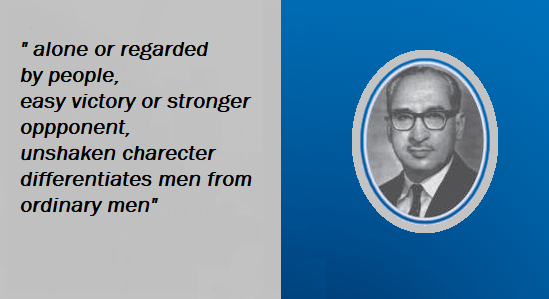R.K. Talwar was a highly respected and admired leader in the Indian banking circles. He served as the Chairman of State Bank of India from 1959 to 1976. He was an inspirational leader, who became a role model of values for many young officers. In this article, a close associate of Talwar, who later became the Chairman of ICICI, recounts some of the qualities, incident.
Under Talwar’s leadership, State Bank of India acquired the high level of professionalism. The State Bank officers acquired a reputation for the clean and business like manner in which they processed the loan proposals. Compared to the rest of the banking system at that time, which was characterized by a cozy relationship between the senior bank executives and the big industrialists, this approach of the State Bank of India brought about a refreshing change.
One of the borrowers of the Bank, a cement company became sick with mounting losses and approached the Bank for restructuring assistance. The economy was undoubtedly passing through a difficult phase at the time. The 1971 war with Pakistan on the issue of Bangladesh left many scars and several marginal companies were facing considerable difficulties. The State Bank of India being the largest Bank was involved with most such enterprises and was always ready and willing to give a helping hand to rescue these companies. What made the problem difficult with respect to this specific company was the strong assessment by the Bank that much of the difficulties of the company were brought about due to gross mismanagement and given the assessment the Bank insisted as a condition precedent to implementing the restructuring package, the Chairman of the company who was also the CEO should step down from the management and a professional management should take over the Company’s management.
This was a standard prescription by the Bank in similar circumstances and it was invariably resisted by the promoters till they reached a stage when it was difficult for them to carry on without the Bank’s help. In the specific case the promoter strongly resisted any attempt to dislodge him from the management position but the Bank held it’s ground.
Then this promoter turned out to be different. He was a friend of Sanjay Gandhi, the son of then Prime Minister of India Mrs. Indira Gandhi and decided to take his case directly to him. To Sanjay Gandhi who was grappling with more serious affairs of the country this turned out to be a minor irritant. He called the Finance Minister and asked him to direct the Bank to waive the requirement. As far as he was concerned he had given his decision and that should have seen the end of the matter. But the problem was the Government was dealing with a different person, Talwar who was not used to taking orders from the Government.
The Finance Minister telephoned Talwar and asked him not to insist on a change in management as a condition precedent to restructuring. Talwar called for the details from the department and having satisfied himself with the merits of the case informed the Finance Minister that it would be difficult for the Bank to waive the requirement of change in management. The Finance Minister sent for Talwar and told him that he had received instructions from the highest authority in the Country who expected him to carry out the orders without demur. Talwar stood his ground and told the Finance Minister in no uncertain terms that there was no way for him to waive the requirement and the Bank’s position would remain unchanged. When this was communicated to Sanjay Gandhi he was quite amused, during the period of about a little more than a year since the Emergency was declared he never met anybody who either disagreed with him or refused to carry out his orders. He decided to send for Talwar to personally talk to him and was shocked to hear from his intermediaries that Talwar refused to come and see him on the ground he held no Constitutional Authority and he was accountable only to the Finance Minister. Sanjay Gandhi’s response was swift and clear, he told the Finance Minister to sack Talwar.
But the Finance Minister faced two sets of problem! Talwar during the seven years he was the Chairman of the Bank achieved a high sense of personal reputation and his removal from the office for what could be called a trivial issue would send bad reputation in the industry, business circles.
The Finance Minister could however manage this because this was a period of emergency and what could have caused a stir in the normal times would pass off as not unusual in the extraordinary circumstances prevailing in the Country. The second problem was much more intractable. When the matter was referred to the Legal department, the Legal department pointed out to the specific provision in the State Bank of India Act which guaranteed the Chairman special protection against removal without sufficient cause. The Finance Minister therefore felt that a better course of action would be to offer Talwar a different assignment or seek his resignation. He sent for Talwar again and told him that the Government was planning to set up a Banking Commission to make recommendations with regard to the restructuring of the functioning of the Banking system and whether he would be willing to accept the Chairmanship of the Commission.
Without batting an eyelid Talwar told the Finance Minister that he would indeed be happy to head the Commission and he could carry out the job simultaneously with his existing assignment as the Chairman of the State Bank.
When the Finance Minister looked somewhat uncomfortable with this suggestion Talwar very calmly looked the Finance Minister in his eyes and told him, “Mr. Minister, you seem to be very particular that I should not continue as the Chairman of the State Bank of India, is that correct?”
The Finance Minister replied, “yes Mr. Talwar, you know what the problem is. We all have the highest regard for your abilities but unfortunately you do not seem to be very flexible on this single issue which is of great importance to the highest authority in the Country. If you do not want to accept any other position, I may have no option but to seek your resignation or in the alternative, to dismiss you from service! This would be extremely painful to me but I would be left with no other option.”
Talwar replied, “Mr. Minister, I have no intention of resigning from my position. It is entirely up to you to decide whether you want to dismiss me. In any case I have just about a little more than a year left in my second term and I see no reason why you should not allow me to complete it!”
The Finance Minister looked pained and miserable.
He terminated the interview and hoped that some solution would be found. He reported the matter to Sanjay Gandhi who was infuriated and asked the CBI to investigate Talwar to find out whether there were any grounds on which he could be dismissed, in terms of Talwar’s personal reputation for honesty and integrity was quite well known and in the normal course it would have been virtually impossible for any investigating agency to charge him with any misconduct. He however had two chinks in his armour. One was his almost monthly visits to Pondicherry which attracted widespread attention both within the Bank and in the political circles. His attachment to the Mother and the Aurobindo Ashram was well known and he made it clear to the Government when the issue once came up for discussion that he needed these visits for what he called recharging his batteries and if as a condition of his employment he was to stop these visits he would step down from the Bank. In any case this could not be construed as a sufficient cause for his dismissal in terms of the Act.
The second one was a little more serious. Talwar sent appeals on behalf of the Ashram to a large number of industrialists many of whom were clients of the Bank seeking donations for the Auroville project. So the Central Investigative Agency decided to focus on the issue and charge him with abuse of authority. While Talwar himself was completely unperturbed by the reported investigation, the Agency started meeting several industrialists who had given donation to the project with a view to taking from them a statement that they were coerced into giving the donation at the instance of Talwar.
At the end of the investigation two things became clear to the Agency. One was not a single industrialist was willing to say Talwar either spoke to them or in any way tried to persuade them to make the donation. The second was what Talwar did was to forward to the clients an appeal signed by the Prime Minister Mrs. Gandhi and the Secretary General of the United Nations U. Thant recommending the Auroville project for support.
The Agency found under the circumstances there was no way in which they could charge Talwar with abuse of his position. When the CBI closed the case as far as the Finance Minister was concerned it was back to square one and he faced the unpleasant task of reporting back to his political master his failure to carry out his diktat. Sanjay Gandhi lost his patience, he directed the Finance Minister to amend the State Bank of India Act to provide for a summary dismissal of the Chairman.
The Legislation amending the State Bank of India Act was passed in record time and received the assent of the President without any delay. Armed with the new provision in the Act the finance Minister summoned Talwar once again and told him that if he did not resign from service there was no alternative but to remove him in terms of the new provision. But Talwar was defiant, he told the Finance Minister that he had no intention of resigning and the Finance Minister could take whatever action he deemed appropriate.
On the evening of the 4th of August 1976 Talwar received a fax message from the Finance Minister sanctioning him 13 months leave and asking him to hand over charge to the Managing Director. It’s amazing that with all the powers in their hands the Government still could not summon up enough courage to dismiss Talwar but instead gave him leave preparatory to retirement for as long as 13 months which he did not ask for! They knew any disrespect to him would mean losing credibility, named as a rowdy government which would do anything it wanted. This was the respect he commanded in the industry. His dedication inspires many government officials to be dedicated to values and has kept the structure of dedication.
Talwar left the Bank at 5.30 P. M. which was his usual time of departure, there was hardly anybody to see him off. Everyone was scared to be seen with him.The residence of the Chairman of the State Bank was just across the road and as soon as I received intimation that he had reached his home, I walked across to meet him. I found him smiling and cheerful. Extending his hand to greet me on my birthday (which by a curious coincidence happened to be 4th August) he said, “Vaghul, look at the Divine Will. What a pleasure it is to be gifted with His Blessings.”
When talked about the removal, He looked me at my eyes and said “As far as I am concerned, I am only an instrument of the Divine and His Will is the only thing that is important to me. We cannot sit in judgment over the Divine will. You have to learn to enjoy all the time the Divine play.The work in the Bank is over. What the Divine has in store for me I do not know. Whatever it is, I will serve the Divine with devotion and always enjoy being His instrument.”
by Narayanan Vaghul
Former Chairman of ICICI Bank Limited.













